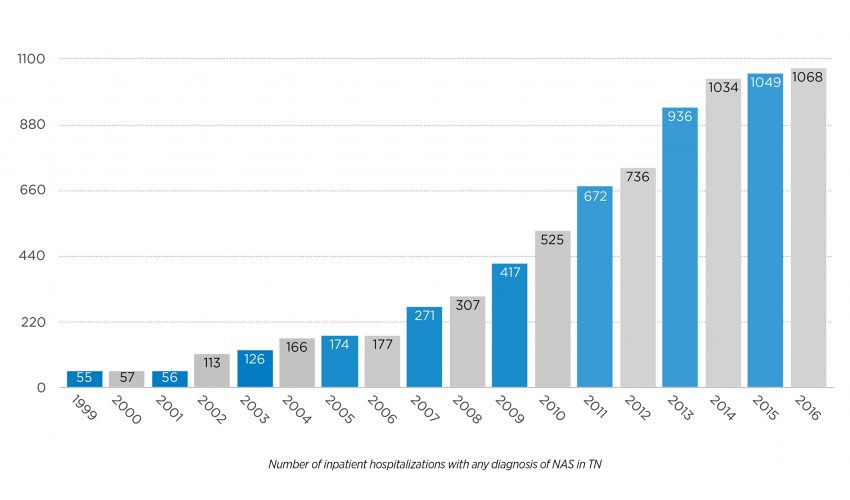Health briefs offer quick but comprehensive information about some of the biggest health challenges Tennessee is facing.
Scroll down to read all about neonatal abstinence syndrome in our state or jump to a specific section:
Neonatal abstinence syndrome (NAS) occurs when a baby is born dependent on drugs used by the mother during her pregnancy.
NAS causes health problems immediately after birth — low birth weight, vomiting, seizures — as well as health and social problems later in life.
Tennessee’s rate of neonatal abstinence syndrome increased 10-fold from 2000 to 2010. The rate in the U.S. has increased only 3-fold during that time.
50–70% of mothers who take opioids during pregnancy will give birth to a baby with NAS. 70% of those mothers are taking at least one medication prescribed by a health care provider.
Neonatal Abstinence Syndrome in Tennessee

Neonatal abstinence syndrome (NAS) occurs when an infant goes through withdrawal from an addictive drug he or she was exposed to in the womb.
How does neonatal abstinence syndrome work physically?
During pregnancy, drugs or alcohol pass through the placenta to the baby, who becomes dependent in utero. When the baby is born, the drug supply is cut off, and he or she goes through withdrawal.
What are the symptoms of neonatal abstinence syndrome?
Symptoms related to NAS can last from one week to six months and can include all of the following:
- Diarrhea
- Excessive or high-pitched crying
- Extreme sensitivity to light and sound
- Fever
- Inability to eat or sleep
- Irritability
- Rapid breathing
- Seizures and trembling
- Slow weight gain
- Stuffy nose, sneezing
- Sweating
- Vomiting
Babies with neonatal abstinence syndrome generally need to stay in the hospital longer than babies who do not suffer from NAS. They may also have serious medical and social problems as adults.
The most common cause of neonatal abstinence syndrome is a woman taking opioids (painkillers) during pregnancy.
This includes a mother who is:
- Receiving treatment for pain or addiction
- Using a prescription medication inappropriately, including using too much or taking someone else’s prescription (also known as a drug that is “diverted”)
- Using an illegal drug
Medications that may cause withdrawal include:
- Opioids (painkillers such as codeine, morphine or oxycodone)
- Benzodiazepines (to help with anxiety or sleep)
- Alcohol
- Antidepressants
- Barbiturates (sedatives)
- Illicit drugs such as cocaine or heroin
- Methadone or buprenorphine, used in medication-assisted treatment (opioid treatment that uses behavioral therapy and medications to treat substance abuse)
Prescriptions
Since 2013, there has been a significant increase in NAS cases where mothers were only exposed to prescription medications.
The percentage of infants with NAS from prescription medication only hit an all-time high in 2015 of 52.5%.
The rates of exposure to prescription medications for infants are:
- 80% — At least one prescription medication
- 5% — Prescription medication only
- 27% — Mix of prescription and illicit or diverted drugs
- 19% — Illicit or diverted drugs only
Sources of Exposure: Neonatal Abstinence Syndrome

From 2002 to 2013, Tennessee’s rate of neonatal abstinence syndrome increased 1,000%. During that time, the rate in the U.S. increased 300%.
In the U.S.
From 1999–2013, the overall incidence of neonatal abstinence syndrome tripled.
- In 1999, there were 1.5 NAS cases per 1,000 births.
- By 2013, there were 6 per 1,000.
In Tennessee
There have been more than 4,000 reported cases of NAS in Tennessee since surveillance began in 2013.
1,068 infants were diagnosed with neonatal abstinence syndrome in 2016 — more than any year prior.
According to the Tennessee Department of Health, the increase from 2015 to 2016 is not statistically significant and may indicate a plateau in cases. But Tennessee’s rate remains considerably higher than the national average.
Does neonatal abstinence syndrome occur everywhere in Tennessee?
Yes, but the majority of cases come from East Tennessee, where opioid drug use is high. The highest rates occur in the East and Northeast and Sullivan County. [2016]
In both rural and urban areas, exposure to prescription medications has become the primary source of NAS.
In Shelby, Knox and Hamilton Counties, a mix of prescription and illicit drugs is most common.
- In Knox County, the instance of NAS caused by people obtaining opioids from a friend, family member or dealer is higher.
- Heroin use is most common in urban areas and surrounding counties.
How much does it cost to treat neonatal abstinence syndrome?
A baby with neonatal abstinence syndrome costs 6 times more to care for than a baby without NAS.
This is due to many factors, including longer hospital stays, higher monitoring costs, medications, health problems that continue after discharge, etc.
Neonatal Abstinence Syndrome by County in Tennessee

Reporting
In 2013, Tennessee became the first state in the nation to require reporting of NAS for public health purposes.
Primary prevention
- Decrease narcotic prescriptions for chronic pain
- Raise awareness about the risks of NAS
- Encourage prescribers to counsel women of childbearing age about narcotics, pregnancy and contraception
Secondary prevention
- Identify pregnant women using drugs early and connect them with treatment
- Use medication-assisted therapy to treat narcotic addiction (It may not prevent NAS in the infant, but it may lessen the likelihood of other complications and/or reduce the severity of the infant’s withdrawal.)
- Reduce the stigma around NAS so women feel comfortable seeking help
Tertiary prevention
- Support and develop best practices regarding the treatment of infants with NAS
- Develop a standardized process for making a NAS diagnosis with evidence-based, cost effective protocol
While NAS rates remain high, experts are reassured that the rate has not increased significantly in the four years since reporting started. This may indicate the NAS epidemic is reaching a plateau, though more time will be needed to determine that with certainty.
The BlueCross BlueShield of Tennessee Health Foundation has contributed more than $3 million to fight neonatal abstinence syndrome in Tennessee.






